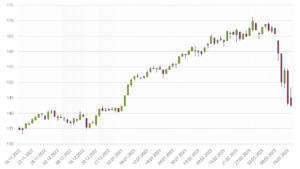The ECB's challenge, the banking sector under pressure
Today's meeting of the European Central Bank triggered great emotions among investors. We have not had a situation in which the market was so strongly divided just before the ECB decision for a long time.
The turmoil associated with the crisis in the banking sector meant that the institution responsible for conducting monetary policy had a "hard nut to crack". The ECB's announcements during the last meeting were clear and an interest rate hike of 50 basis points should have been expected, but until the decision the market lived in uncertainty.
The ECB upheld the assumptions
The European Central Bank kept its word and as expected raised interest rates by 50 basis points. The current base interest rate is 3.50%. The main motivation for the central bank's actions is the desire to bring inflation down to the medium-term target of 2%. In the communiqué, the ECB also referred to current events that determine market sentiment. The Governing Council closely monitors market tensions and stands ready to react if necessary, with a full set of tools to ensure a smooth transmission of monetary policy. However, assurances have been given that the euro area banking sector is resilient and sound in terms of both capital and liquidity.
At the same time, the decision to continue reducing the APP program was upheld. The reduction of the portfolio until June 2023 will be carried out at a rate of €15 billion per month, with longer-term decisions to be made in the future.
The ECB also prepared the latest macroeconomic projections, however, when publishing them, there was a reservation that they were created before the increase in tensions in the financial markets. The current situation additionally increases the uncertainty related to the assessment of the outlook for economic growth and inflation. According to the ECB, strong inflationary pressure will continue in the coming months. Experts predict that the price index in 2023 will amount to 5.30%, to decrease in subsequent years to 2.90% and 2.10%, respectively.
Expectations regarding economic growth have also been revised. Declining energy prices as well as greater resistance to global macroeconomic challenges mean that the European Central Bank expects GDP growth in 2023 at the level of 1.00%. The dynamics of development supported by a good situation on the labor market, improved confidence and recovery in real incomes will make economic growth accelerate to 1.60% in the coming years.
Christine Lagarde press conference
In the first part of her speech, the head of the ECB focused on the outlook for the economy. Lagarde believes that the economy will recover in the coming quarters, including due to the good situation on the labor market and the increase in industrial production. The risk balance for economic growth is currently tilted in the negative direction. Most long-term forecasts assume that inflation will be around 2%, however, in light of recent volatility and uncertainty, this issue requires ongoing monitoring. One of the observed elements is the increase in wage pressure. Lagarde also noted that service price inflation is largely due to past increases in energy prices.
Christine Lagarde during the press conference assured that European Central Bank will closely monitor developments related to the condition of the banks. The resulting tensions in the financial markets are serious and their persistence may have further repercussions and be a risk factor for inflation. However, Lagarde stresses that the banking sector is in a much better position than it was in 2008.
Currently, it is impossible to determine the future path of interest rates, and the main reason for this development is the increase in market uncertainty. However, if tensions ease, the ECB will still have a lot of work to do. Today's decision was supported by the majority of members, however, 3-4 people felt that more time was needed to monitor developments. The next decisions of the central bank will depend to a large extent on the incoming macroeconomic data, as well as the effectiveness of the transmission of the existing interest rate increases, e.g. for corporate lending.
The decisions of the European Central Bank were adopted with a great deal of caution. In the first moments after the decision, the single currency of the euro zone weakened and sentiment on the global stock indices deteriorated. The increase in the value of 10-year German government bonds continued, the yield of which fell by 10 basis points within a dozen or so minutes. After a few minutes, the mood calmed down. However, given the market reaction, one can conclude that investors are concerned that today's decision may further tighten the current financial conditions.
Banking sector under pressure
Media reports from the financial markets have been dominated in recent days by the problems of banks, which put the ECB in a difficult position. Last week, the US Silicon Valley Bank collapsed, and fears spilled over to the European market, where the Swiss economy came under pressure Credit Suisse. Credit Suisse's dire financial situation is nothing new to investors, and the trouble has only gotten worse in recent years. Difficulties resulted, among others, from from gigantic fines that the bank had to pay to the US as a result of improper practices (sale of "toxic" financial products or helping to avoid paying taxes).
We had to deal with the escalation of problems in 2021, when Credit Suisse recorded a loss of approx. PLN 5 billion as a result of the collapse of the Archegos Capital Management fund. To make matters worse, many clients, as a result of the loss of trust, began to withdraw funds accumulated on deposits. A combination of many events led to the announcement of a restructuring plan. The bank did not manage to go straight, and received another blow. On Wednesday, the president of Saudi National Bank, the largest shareholder, announced that for regulatory reasons there was no possibility to increase the capital commitment in Credit Suisse. This situation intensified the market tension and caused very dynamic declines in the share prices of European banks. The Stoxx 600 Banks index lost nearly 20% during the week, and the scale of the collapse during the session reached 7%.
The growing concern about the bank's bankruptcy was reflected, among others, in the CDS quotations reached record levels. The situation has become so serious that there has been speculation about ECB inquiries by individual banks regarding their exposure to Credit Suisse. The American and French authorities also assured about the monitoring of the current status. Ultimately, the central bank threw a lifeline for the Swiss giant. The SNB provided support in the form of a loan backed by high-quality assets of up to CHF 50 billion. A large part of the amount, as much as PLN 39 billion, was used immediately, which proves that the bank was in a difficult situation. At the same time, Credit Suisse undertook to redeem bonds in the amount of CHF 3 billion. This temporarily calmed the mood among investors, but there are growing concerns whether similar events and problems of other banks, which are a kind of "repeat of entertainment", are in store for us in the coming weeks.
The situation in the global banking sector has a significant impact on market sentiment and expectations regarding central bank decisions. In recent days, record-breaking declines in bond yields and an increase in the value of gold have been observed, which indicates increased risk aversion. Dealing with problems in the banking sector, in addition to inflation, is becoming a key challenge facing major central banks now.
Summation
The European Central Bank did not surprise investors by continuing its cycle of interest rate hikes as expected. At the same time, the institution responsible for monetary policy assured that the current situation related to the banking sector is closely monitored. The central bank ensures that it will take the necessary actions if necessary. Investors reacted very cautiously to the ECB's decision.
The dynamics of market events and the experience of recent days show that conservatism is indicatedand the scale of the resulting tensions is not easy to contain. Despite the strenuous actions of central banks and attempts to calm the situation, nervousness is visible and it should not be ruled out that in the coming weeks we will be dealing with a "repeat of entertainment". Investors need to remain vigilant and expect the increased market volatility to stay with them for longer.
Source: Piotr Langner, WealthSeed Investment Advisor
Disclaimer
This document is only informative material for use by the recipient. It should not be understood as an advisory material or as a basis for making investment decisions. Nor should it be understood as an investment recommendation. All opinions and forecasts presented in this study are only the expression of the author's opinion on the date of publication and are subject to change without notice. The author is not responsible for any investment decisions made on the basis of this study. Historical investment results do not guarantee that similar results will be achieved in the future.






















![Forex Club – Tax 9 – Settle tax on a foreign broker [Download the Application] Forex Club - Tax 9](https://forexclub.pl/wp-content/uploads/2024/02/Forex-Club-Podatek-9-184x120.jpg?v=1709046278)
![Trading View platform – solutions tailored to the needs of traders [Review] trading view review](https://forexclub.pl/wp-content/uploads/2024/03/trading-view-recenzja-184x120.jpg?v=1709558918)
![How to connect your FP Markets account to the Trading View platform [Guide] fp markets trading view](https://forexclub.pl/wp-content/uploads/2024/02/fp-markets-trading-view-184x120.jpg?v=1708677291)
![How to invest in ChatGPT and AI? Stocks and ETFs [Guide] how to invest in chatgpt and artificial intelligence](https://forexclub.pl/wp-content/uploads/2023/02/jak-inwestowac-w-chatgpt-i-sztuczna-inteligencje-184x120.jpg?v=1676364263)


![WeWork – the anatomy of the collapse of a company valued at $47 billion [WeWork, part II] wework bankruptcy story](https://forexclub.pl/wp-content/uploads/2024/04/wework-bankructwo-historia-184x120.jpg?v=1711729561)
![Adam Neumann – the man who screwed up Softbank [WeWork, part AND] adam neumann wework](https://forexclub.pl/wp-content/uploads/2024/04/adam-neumann-wework-184x120.jpg?v=1711728724)





![How to transfer shares to another brokerage office [Procedure description] how to transfer shares to another brokerage house](https://forexclub.pl/wp-content/uploads/2024/03/jak-przeniesc-akcje-do-innego-biura-maklerskiego-184x120.jpg?v=1709556924)

![The most common mistakes of a beginner trader - Mr Yogi [VIDEO] Scalping - The most common mistakes of a beginner trader - VIDEO](https://forexclub.pl/wp-content/uploads/2024/03/Scalping-Najczestsze-bledy-poczatkujacego-tradera-VIDEO-184x120.jpg?v=1711601376)
![Learning patience: No position is also a position - Mr Yogi [VIDEO] Scalping - Learning patience - No position is also a position - VIDEO](https://forexclub.pl/wp-content/uploads/2024/03/Scalping-Nauka-cierpliwosci-Brak-pozycji-to-tez-pozycja-VIDEO-184x120.jpg?v=1710999249)
![When to exit a position and how to minimize losses - Mr Yogi [VIDEO] Scalping - When to exit a position and how to minimize losses - VIDEO](https://forexclub.pl/wp-content/uploads/2024/03/Scalping-Kiedy-wyjsc-z-pozycji-i-jak-minimalizowac-straty-VIDEO-184x120.jpg?v=1710336731)


















